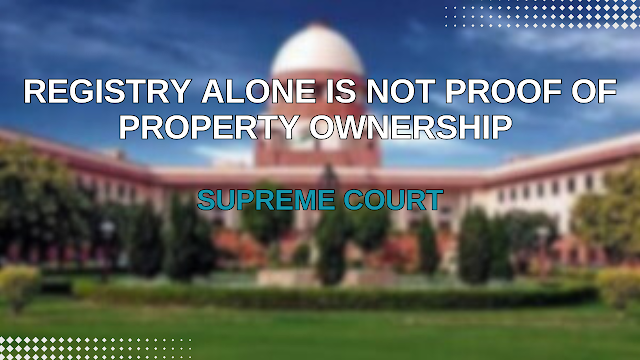Supreme Court Verdict: Registry Alone Is Not Proof of Property Ownership – What Every Property Buyer Must Know
Introduction
In a significant and eye-opening judgment, the Supreme Court of India has ruled that merely registering a sale deed is not enough to prove ownership of a property. This ruling is a wake-up call for millions of property buyers, sellers, and real estate agents across India. The verdict makes it clear that property ownership requires a clear and valid title, not just a registered document.
Let us understand what this judgment means, why it was given, and what common property buyers must do to protect their rights.
What Was the Case?
The judgment came in two related matters – one from Telangana and one from Andhra Pradesh – where disputes arose even after property sale deeds had been registered. The Court observed that the registration process is a procedural formality and does not verify the legal ownership of the seller. Therefore, if the seller’s title is unclear or invalid, the buyer cannot become a legal owner even after registering the property.
Key Points from the Supreme Court Verdict
Registration ≠ Ownership: Registering a property does not automatically make you the legal owner. The registration department only checks documents—not ownership validity.
Title is Supreme: The person selling the property must have a clear legal title. If their title is defective or disputed, the registration is not valid proof of transfer.
No Role of Registrar in Title Verification: The Sub-Registrar does not have the authority or tools to verify who actually owns the land or property. They only ensure that the documents are complete and the correct fee is paid.
Possession + Title + Registration = Ownership: For valid ownership, a person must have legal title, be in possession, and register the property.
Why This Judgment Matters
This judgment is a big deal for the real estate industry because many people believe that registration is the final step in owning property. But this verdict shows that buyers must go beyond registration and do a full due diligence check.
It also brings accountability to:
Real estate agents
Developers
Lawyers
Property sellers
What Common Buyers Should Do Now
Before buying any property, make sure to follow these steps:
Check the Title Deed: Ask for the original title deed and verify that the seller has legal ownership.
Verify the Chain of Ownership: Check all previous sale deeds to ensure that every transfer of ownership was legal.
Mutation Records: Confirm that the property is mutated in the seller’s name in land or municipal records.
Encumbrance Certificate (EC): Get an EC from the sub-registrar’s office for the past 10-30 years to ensure the property has no legal or financial issues.
Possession Documents: Check electricity bills, tax receipts, and occupancy certificates to confirm possession.
Consult a Lawyer: It’s always wise to hire a property lawyer to verify all documents.
Impact on Property Transactions
Buyers will need to spend more time and money on verifying ownership.
Sellers must provide complete documentation and valid title.
Banks and Lenders may also tighten scrutiny before approving home loans.
Real Estate Developers will have to make title verification part of their project transparency.
Important Documents You Must Check Before Buying
| Document | Purpose |
|---|---|
| Sale Deed | Proof of sale, not proof of ownership alone |
| Title Deed | Legal proof of ownership |
| Encumbrance Certificate | Confirms no dues or legal cases on the property |
| Mutation Certificate | Shows property is recorded in the buyer's/seller's name |
| Tax Receipts | Confirms regular payment of dues |
| Possession Certificate / Bills | Evidence that the person actually occupies the property |
Example Situations
Example 1: Ram buys land with a registered deed but doesn’t check whether the seller actually owned it. Later, the original owner appears and reclaims it. Ram loses the land.
Example 2: Sita buys a flat from a builder who didn’t get full approval for the land. Even though her sale deed is registered, the flat is declared illegal by authorities.
In both cases, registration failed to protect ownership.
The Legal Principle: Title Supersedes Registration
The Court emphasized that registration is just evidence of a transaction. It is not proof that the seller had the right to sell. Ownership comes from a clear and valid title.
This principle is critical in states like Uttar Pradesh, Maharashtra, Karnataka, Telangana, and others where many disputes arise from unclear land records.
Conclusion: What You Should Remember
This judgment highlights one key point: Never assume registration equals ownership.
You must:
Do a full legal check
Verify the seller’s title
Check previous ownership documents
Consult a legal expert if needed
Buying property is a big investment—don’t risk it by skipping due diligence.
Final Thought
The Supreme Court’s verdict brings clarity and responsibility to property transactions. It also protects honest buyers from fraud—but only if they act wisely.
So, next time you plan to buy property, remember: A stamp on paper isn’t ownership. Legal title is.
Stay informed. Stay protected.





Comments
Post a Comment